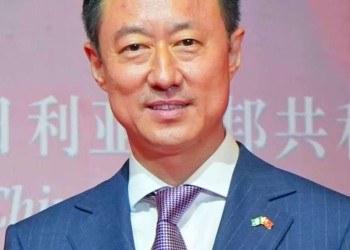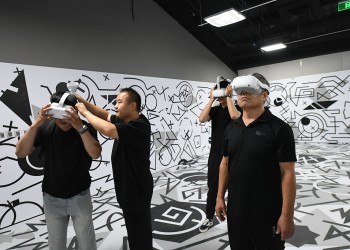Nigeria officially joined the Belt and Road Initiative Family in 2018 during the Muhammadu Buhari led administration. The country has now become one of the biggest beneficiaries of China’s Belt and Road Initiative, a global infrastructure development strategy aimed at promoting economic cooperation among countries.
President Xi Jinping in his book Governance of China said,”We will champion the cause of building a global community of shared future and share with the world our approach to development, civilization, security, human rights, the eco-environment, international order and global governance, based on our successful experience and history dating back morw than 5,000 years”. There is no doubt that the Chinese government is indeed living up to it billing with series of developmental projects going on around the word to ensure that a desire future is attainable. In Nigeria today those mile stone infrastructural projects will surely ensure we get to the share future together.
There is no doubt that BRI in Nigeria has resulted in the construction of several critical infrastructure projects in Nigeria, including power plants, ports, and railway lines. The benefits of Initiative to Nigeria are numerous, including improved transport infrastructure that has enhanced the country’s connectivity with the rest of the world, increased foreign investment, and job creation.
Since independence the power sector that is supposed to drive the economy has suffered greatly, however, as of today the initiative is addressing the country’s power deficit by providing much-needed power plants to boost electricity supply, thereby stimulating economic growth and development.
There is no gain saying that the initiative has provided Nigeria with a significant opportunity to bridge its social and economic infrastructure gap and address its development challenges. A good example of one of the major landmark is the construction of the Lekki Deep Seaport in Lagos State expected to have a significant impact on the economy, with projections suggesting that it will generate over 170,000 jobs and contribute significantly to Nigeria’s GDP. The Belt and Road Initiative is having transformative impact on Nigeria, providing much-needed infrastructure to support its economic development.
President Bola Tinubu bought into the Belt and Road Initiative seeing it as a bedrock for economy development as such made a huge appearance at the 10th year Anniversary of the Belt and Road Summit in Beijing China. His Excellency Senator Kassim Shettima led the Nigerian delegation to the event that has laid a developmental pathway for the country.
The Vice President salute China for hosting the all important Forum that has brought about developments to many countries that align with the Initiative . He noted that Nigeria and China are good friends who have supported each other in times of difficulties. He emphasis that “China has always treated Nigeria and other African countries with respect and as equals; it has never bossed them around, and has done its best to support the African people in seeking independence and development”. Shittima was full of appreciation to the Chinese government for rolling out series of important global cooperation initiatives for developing countries, providing valuable assistance for Nigeria’s development,and boosting the industrialization process of Nigeria and Africa at large. Going by all the visible cooperation that has set Nigeria on a path of development, the Vice President stressed that Nigeria is ready to further deepen Belt and Road cooperation with China and lift Nigeria-China relations to a new level.
The Vice President addressed the High-Level Forum on Digital Economy of the forum, adding that Nigeria is keen on using the instrumentality of the existing robust Nigeria-China bilateral relations to maximally key into projects under the platform of the Digital Silk Road for the improvement of Nigerian digital space. He said President Tinubu remains committed to a stronger Nigeria-China tie characterized by respect, non-political interference and mutual international cooperation.
The visit to China accorded the Vice President to witness and supervise the signing of MoU that will speedy up developmental projects in Nigeria. There are several Agreements signed on the sideline, Chief among those agreement are that of the National Agency for Science and Engineering Infrastructure and three Chinese partners for new projects valued at $2 billion, as well as letters of intent between the Chinese and Nigerian partners for new projects and investments worth $4 billion. The Federal Ministry of Works also signed an MoU with China Harbour Engineering Company Ltd for the construction of the Lekki Blue Seaport contract at the Lekki Free Trade Zone in Lagos.
The Vice President was accompanied by the Minister of Foreign Affairs, Ambassador Yusuf Tuggar; Minister of Power, Mr Adebayo Adelabu; Minister of Transportation, Mr Saidu Alkali and His Excellency Baba Jidda Ambassador of Nigeria to China, among others.
President Xi Jinping said “we need to make our international discourse more effective and see that our communicators are competent and can adapt to the needs of international communication in the new era”. This is a fact that has been proven times without number. In implementing the above statements, MoU with other nations that will facilitate defectiveness was signed with Nigeria.
Nigeria and China have received a boost in terms trade relations following the signing of a Memoranda of Understanding (MoU) between the National Agency for Science and Engineering Infrastructure (NASENI) and three Chinese firms for new projects valued at $2 billion.
The Nigerian government also received letters of intent for new projects and investments worth $4 billion from more Chinese companies, in addition to that Federal Ministry of Works signed an MoU with China Harbour Engineering Company Ltd for the construction of the Lekki Blue Seaport contract at the Lekki Free Trade Zone in Lagos.
According to a statement by Stanley Nkwocha, Senior Special Assistant to the Vice President on Media and Publicity, the MoUs were signed on the sidelines of the 3rd Belt and Road Forum for International Cooperation, held in Beijing, China between 17-18 October 2023.
Vice President Kashim Shettima, who represented President Bola Ahmed Tinubu at the Forum, witnessed the event, which also had the Ministers of Foreign Affairs, Power, Works, and other top government officials present.
Speaking to Journalists after the signing ceremony, Shettima commended all stakeholders and their Chinese counterparts, saying Nigeria has never been this ripe and ready for businesses to thrive.
He said with the meticulous efforts by the President Tinubu administration to ensure a level playing ground for all investors following the removal of all bottlenecks, the coast is now clear for deepened economic and trade collaborations.
Executive Vice Chairman of NASENI, Khalil Halilu, said the manifestation of the agreements was a fulfilment of NASENI’s commitments towards boosting the Foreign Direct Investment drive of the Bola Tinubu administration. In his words, “This is a very important day for us at the National Agency for Science and Engineering Infrastructure because it is a day to show the results of some of the work that we have been doing in the last six weeks since I assumed the leadership of NASENI,”
The three MOUs to partner with NASENI include the construction of a new energy automobile facility for the production of new energy electric vehicles by Shanghai Launch Automotive Technical Co Ltd; construction of turnkey delivery of Unmanned Aerial Vehicles (UAV) assembly line projects by China Great Wall Industry Corporation; and the transfer of technology on lithium batteries, electric vehicles and allied technologies by Newway Power Technology Company Ltd.
The Chinese firms that presented Letters of Intent to the Vice President to pull together $ 4 billion in investments are TBEA (solar products); DongFeng Vehicles Co. (vehicle design and production), and HiLong Energy (CNG, LNG, methanol).
Others are Space Star Technology (Drone technology transfer); ENRIC (clean energy utilization technology); Hidier Group (development of new industrial park), China State Construction Company (building technology and materials); CIMC (natural gas infrastructure delivery); Value Platform International Services Ltd (vocational training) and Acadia Technologies (Shenzhen) Co. Ltd. (smart grids and microgrids).
Shettima also met with several communications, tech, railway, power and construction giants based in China. They include the China National Electric Engineering Co. Ltd, China Civil Engineering Construction Corporation (CCECC), China Electronics Technology Group Corporation (CETC), China Railway Construction Corporation (CRCC), China Communications Construction Co. Ltd (CCCC), HUAWEI Technologies, Senteng International Company Nigeria Limited, China National Electric Engineering Co. Ltd and Zhejiang Dahua Technology Co. Ltd.
The Belt and Road Initiative has been a game-changer for Nigeria’s economic development, providing much-needed infrastructure that will support sustained growth for years to come. With continued investment in critical sectors of the economy, Nigeria is poised to benefit even more from the initiative, fostering economic growth and reducing the development gap with other developed nations.
At the 3rd BRI Forum President Xi Jinping said, “Building a multidimensional Belt and Road connectivity network. China will speed up high-quality development of the China-Europe Railway Express, participate in the trans-Caspian international transportation corridor, host the China-Europe Railway Express Cooperation Forum, and make joint efforts to build a new logistics corridor across the Eurasian continent linked by direct railway and road transportation”
It has also led to the development of Nigeria’s digital infrastructure, with the construction of fiber optic networks and the establishment of technology parks.The initiative has facilitated trade between Nigeria and other countries, opening up new markets for Nigerian goods and services.
In addition to physical infrastructure, the Belt and Road Initiative has also supported human capital development in Nigeria through training programs and scholarships. The initiative has encouraged private sector participation in infrastructure development, leading to increased competition and better service delivery.
The Belt and Road Initiative has also spurred innovation in Nigeria, with the establishment of research and development centers in various sectors such as agriculture, healthcare, and renewable energy, helping to diversify Nigeria’s economy by promoting investment in non-oil sectors such as manufacturing, tourism, and ICT.
Through the Belt and Road Initiative, Nigeria has been able to access affordable financing for infrastructure projects from Chinese banks and other financial institutions. The initiative has also enhanced cultural exchange between Nigeria and China, promoting understanding and cooperation between the two countries. In the midst of the on going developmental projects, an avenue to improve the quality of life for Nigerians by providing access to basic amenities such as healthcare facilities, schools, and clean water has been created. Of great importance is BRI also facilitated knowledge transfer between China and Nigeria, with Nigerian professionals gaining valuable experience working on Belt and Road projects.













































